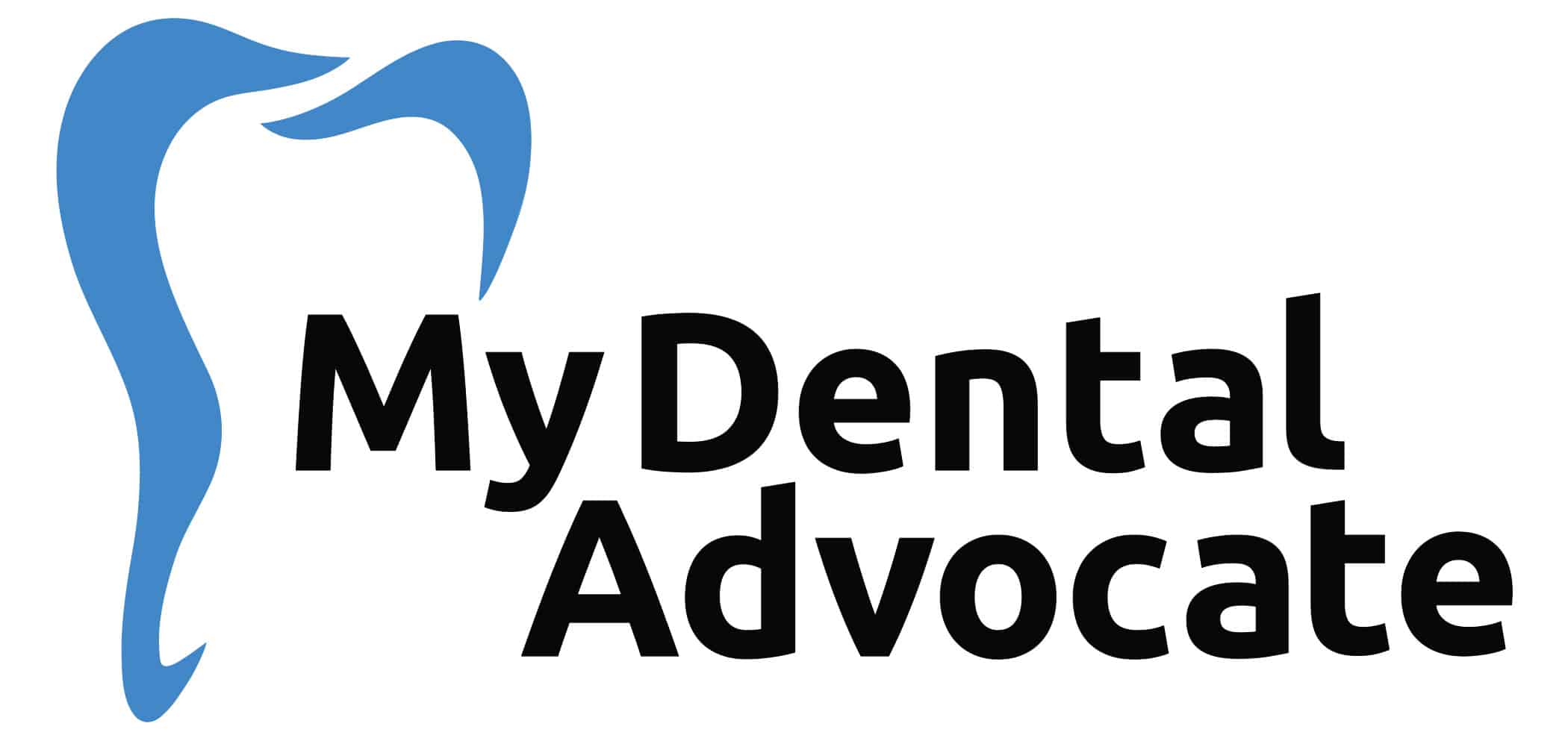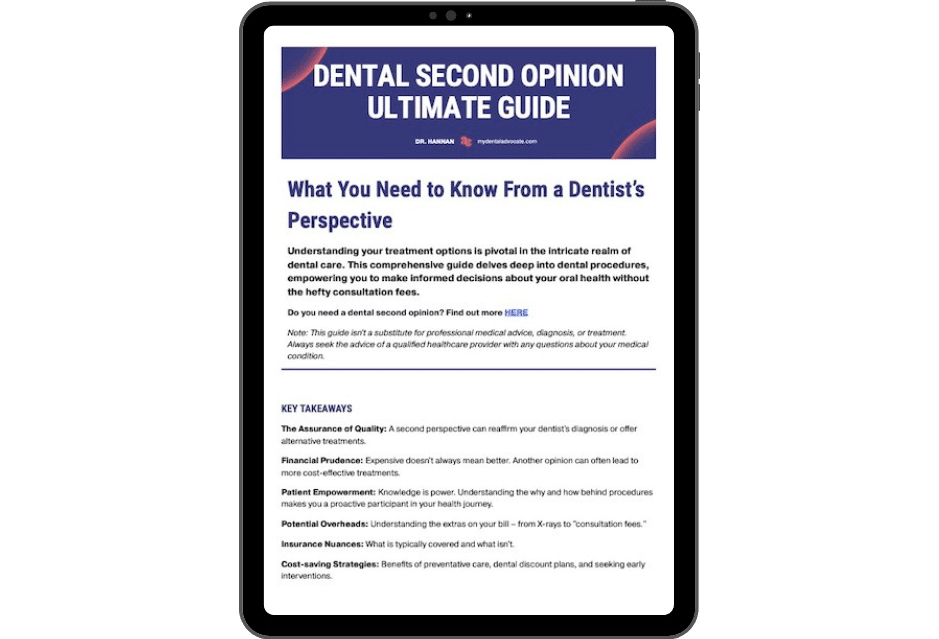Why Are Dental Implants So Expensive? (Dentist Perspective)
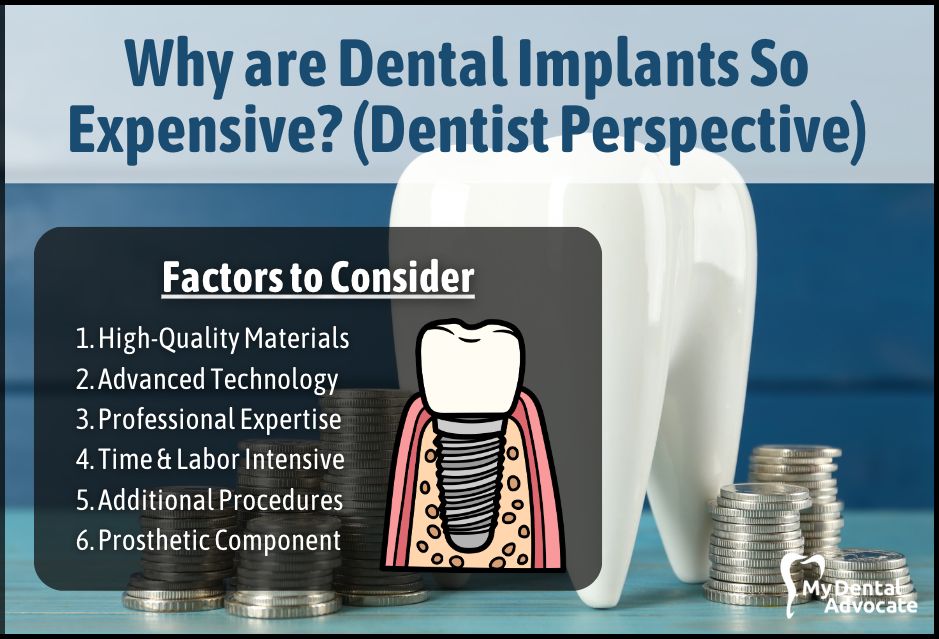
Thinking about dental implants but recoiling at the expense?
You’re not alone.
Dental implants, prized for durability and realism, are costly due to factors like the materials used, required expertise, and possible additional procedures.
Yet, despite their upfront cost, their longevity could make them a worthwhile investment in the long run.
Need Dental Advice? Ask Dr. Hannan!
Why Are Dental Implants So Expensive?
If you’re considering dental implants, you may wonder why they are so expensive.
Here are some factors that contribute to the high cost of dental implants:
High-Quality Materials
Dental implants are made of high-quality materials designed to last a lifetime. The cost of these materials, such as titanium and zirconia, is one reason dental implants are so expensive.
Additionally, the crown or bridge attached to the implant is custom-made to fit your mouth perfectly, which adds to the cost. These materials enable the implants to integrate with the jawbone without causing adverse reactions, ensuring durability and function.
Advanced Technology
The procedure involves the use of sophisticated dental technology. From initial 3D imaging for precise placement to the actual surgical equipment, the expense of these advanced technologies contributes to the overall cost.
Recommended Reading: Who is Not Suitable for Dental Implants? (Dentist’s Perspective)Professional Expertise
Dental implant surgery is a complex process requiring high skill, experience, and training. Unfortunately, this expertise comes at a price.
The dental surgeon must accurately place the implant into the jawbone to avoid damaging vital structures like nerves and blood vessels and ensure the implant successfully integrates with the bone.
The cost of dental implants can vary depending on factors such as the need for additional preparation procedures like tooth extraction, sinus elevation, and bone grafting.
In addition, dental implants require a high level of skill and expertise to place correctly. Therefore, dentists and oral surgeons must undergo extensive training and continuing education to perform implant surgery.
This level of knowledge comes at a cost, which is reflected in the price of the procedure.
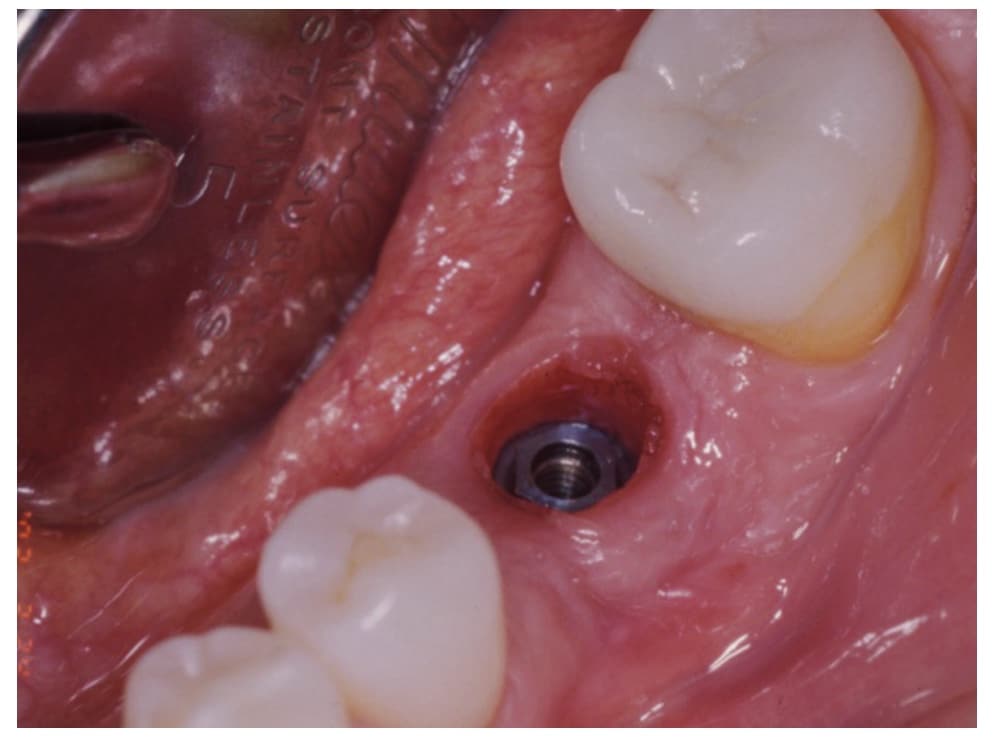
Time & Labor Intensive
The dental implant process takes a lot of work. It involves multiple visits over several months.
In addition, the implant needs time to fuse with the jawbone properly before the abutment and crown can be attached. This time and labor intensity add to the cost.
Additional Procedures
Some patients may need additional procedures before receiving implants, such as bone grafting to ensure adequate bone volume to support the implant. This will add to the overall cost.
Prosthetic Component
After the dental implant integrates with the bone, a custom-made crown, bridge, or denture is attached to the implant post.
Fabricating these prosthetic components, usually made of high-quality, tooth-like materials for aesthetic appeal and durability, also contributes to the cost.
Recommended Reading: How Long Before Dental Implants Feel Normal? (Comprehensive Guide)Overall, dental implants are a significant investment in oral health and quality of life. While the out-of-pocket costs may seem high, dental implants’ long-term value and benefits are worth it.
Many dental practices offer payment plans and financing options to help make the cost more manageable. Check with your insurance provider to see if they cover dental implant costs.
The Dental Implant Process (Start to Finish)
Dental implant treatment is a multi-step process that requires several appointments with your dentist, oral surgeon or periodontist. Here are the main steps involved in the process:
Initial Consultation & Assessment
First, your dentist will conduct a thorough examination, which may involve X-rays or 3D images, to assess the health of your teeth, gums, and jawbone. This is also when your dentist will discuss your treatment options and establish if dental implants suit you.
They will also evaluate your oral health to determine if you are a good candidate for dental implants.
Recommended Reading: Loose Dental Implant (What Does It Mean?)Treatment Planning
A personalized treatment plan is created if you’re deemed a good candidate for dental implants. This plan details the type and location of the implants, the need for additional procedures, and the timeline for the treatment.
Preparation Procedures (if necessary)
Some patients might need preparatory procedures like tooth extractions or bone grafts. Bone grafts are usually necessary if your jawbone isn’t thick enough or is too soft to support implants.
However, this can add several months to the treatment timeline as the graft needs time to heal and fuse with the existing bone.
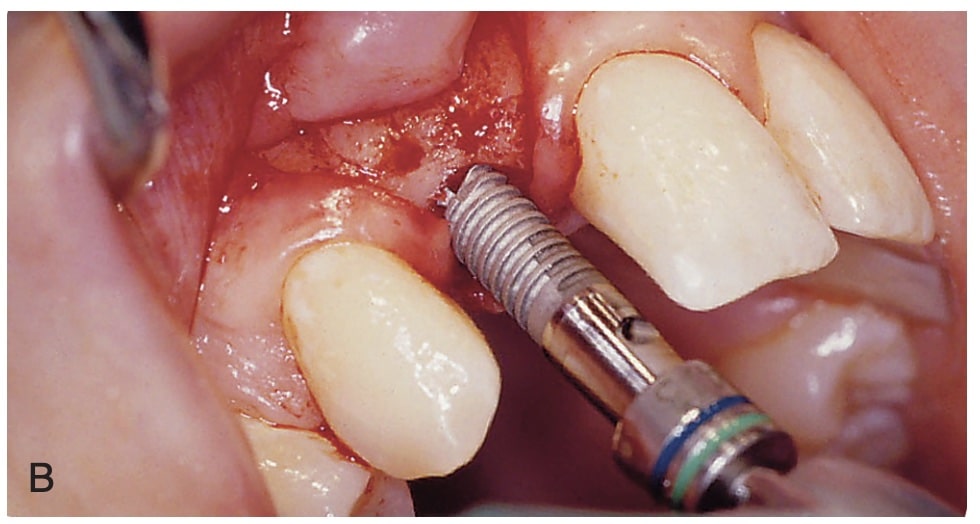
Implant Placement
The surgery itself involves placing the titanium implant posts into your jawbone. This is done under anesthesia to ensure you are comfortable and pain-free during the procedure.
Next, the surgeon will make a small incision in your gums and insert the implant posts into your jawbone. Once the posts are in place, the gums are stitched back up.
Osseointegration
This is a critical healing phase that may last several weeks or months. During osseointegration, the dental implant fuses with your jawbone, creating a solid foundation for the artificial tooth.
Abutment Placement
Once healing is complete, an abutment – a small connector that holds the replacement tooth – is attached to the implant. In some cases, the abutment is placed with the implant crown.
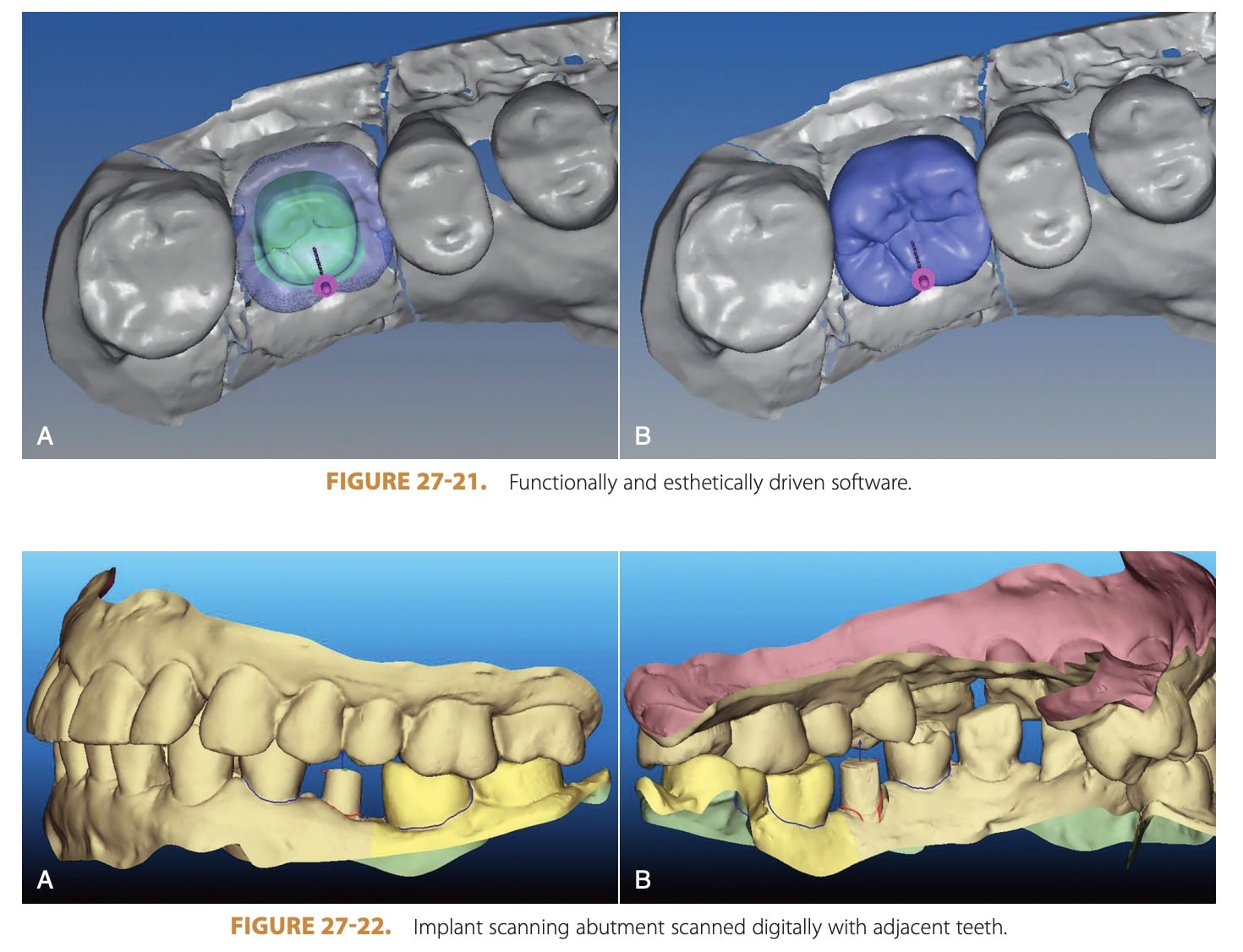
Crown Attachment
Finally, once your gums heal around the abutment, impressions of your mouth and remaining teeth are taken. These are used to create your custom-made crown (artificial tooth). When ready, this crown is attached to the abutment.
Recommended Reading: 101 Foods to Eat After Dental Surgery, Implants or Wisdom Teeth RemovalGetting dental implants can take several months, but the results are durable and can last a lifetime with proper care.
The cost of dental implants can vary depending on several factors, including the materials used, the expertise of the dentist or surgeon, and your location.
Dental insurance may cover some or all of the cost of the procedure, so be sure to check with your provider before scheduling your appointment.
Benefits of Dental Implants
Dental implants offer numerous advantages, making them a popular tooth replacement choice.
Key Benefits
- Natural Look and Feel: Dental implants mimic natural teeth in appearance and function, blending with your existing teeth and boosting confidence.
- Improved Oral Health: Implants don’t require altering adjacent teeth like bridges do, promoting better oral hygiene due to easier access between teeth.
- Durability: Designed to integrate with bone, implants are a long-lasting solution. With proper care, they can endure a lifetime.
- Facial Structure Preservation: Implants stimulate bone growth, preventing bone loss and maintaining your facial structure’s natural shape.
- Enhanced Eating and Speaking: Unlike dentures, which can slip and cause issues, implants function like natural teeth, improving speech and eating comfort.
- Convenience: Implants are a permanent solution requiring no special care beyond routine brushing and flossing, unlike removable dentures.
- Prevents Teeth Shifting: Implants fill the gaps left by missing teeth, preventing adjacent teeth from shifting and avoiding bite misalignment.
How to Get Cheap Dental Implants
While dental implants are typically a substantial investment due to their high quality, longevity, and the advanced skills required to place them, there are some ways to find more affordable options.
Recommendations
- Dental Schools: They offer procedures at lower costs, performed by students under expert supervision, ensuring quality care at affordable prices.
- Clinical Trials: Participating in clinical trials for new dental treatments, including implants, can provide reduced-cost or free treatments.
- Dental Charities and Non-Profits: These organizations sometimes offer dental assistance, potentially including implants, focusing mainly on emergency needs.
- Dental Tourism: Traveling to countries with lower dental costs is an option, but it’s crucial to verify the dentist’s credentials, hygiene standards, and implant quality. Remember to factor in travel and potential follow-up costs.
- Dental Discount Plans: Membership-based plans offering discounted dental services, including implants, for an annual fee.
- Payment Plans and Financing: Some dental offices provide payment plans for implants, and healthcare credit companies offer medical procedure loans, sometimes at low or no interest.
The cost of a single dental implant can range from $1,000 to $3,000, and the abutment and crown can add an additional $500 to $3,000.
Remember, while cost is a significant consideration, it’s crucial not to compromise the quality of care. It’s better to invest in a quality procedure that provides a lasting solution than to opt for a cheaper alternative that may cause problems.
Always consult your dentist and consider all the pros and cons before deciding on a treatment plan.
Alternatives to Dental Implants
- Dental Bridges: Bridges fill gaps from missing teeth, consisting of crowns on abutment teeth and a false tooth in between. Traditional bridges, involving reshaping adjacent teeth, typically last about 10 years, shorter than implants.
- Partial Dentures: Removable appliances replacing a few teeth, attached to natural teeth with clasps. Less costly than implants, but may offer less comfort and stability, requiring more upkeep.
- Complete Dentures: Suitable for completely toothless mouths, resting on the gums. They’re more affordable than implants but can lack comfort, stability, and natural feel, potentially affecting taste.
- Resin-Bonded Bridge: Ideal for front teeth, this bridge has a false tooth bonded to metal bands attached to abutment teeth, causing less damage to surrounding teeth. Not suitable for areas under high biting force.
- Tooth-Supported Overdenture: Utilizes remaining healthy teeth to support a removable denture, enhancing stability compared to regular dentures.
While each of these alternatives has its advantages, it’s important to note that none offers the full range of benefits that dental implants do – such as preventing bone loss, superior comfort and stability, and not requiring alteration of adjacent healthy teeth.
In addition, each person’s situation is unique, so a discussion with your dentist is vital to determine the best option for you.
Frequently Asked Questions (FAQ)
How long does the dental implant process take?
The entire process can take several months. It starts with the initial consultation and includes stages such as implant placement, healing time, and crown attachment. The timeline varies depending on individual health factors and whether any preparatory procedures, like bone grafts, are needed.
What are some alternatives to dental implants?
Alternatives to dental implants include dental bridges, partial dentures, complete dentures, resin-bonded bridges, and tooth-supported overdentures. Each has its own advantages and disadvantages, and the choice depends on the individual’s oral health, budget, and personal preference.
Can dental insurance cover the cost of implants?
Dental insurance coverage varies widely. Some insurance policies cover a portion of the cost of dental implants, while others might not cover the cost at all. It’s crucial to check with your insurance provider to understand your policy specifics.
My Experience & Expertise
Drawing from my years of experience as a dentist, I’ve seen firsthand the transformative impact of dental implants on patients’ lives.
These advanced tooth replacements, developed using state-of-the-art materials and technology, offer a highly effective, long-lasting solution for tooth loss.
Although these improvements contribute to the higher cost, they also ensure the durability and effectiveness of the implants. Remember, the price varies depending on factors like the number of implants, tooth location, and your oral health condition, all of which influence the complexity of the procedure.
Ultimately, while dental implants come with a higher upfront cost, their substantial benefits – from boosting self-confidence to enhancing the quality of life – make them a worthwhile investment.
Need a second opinion? We can help! Learn more. Knowledge is power when cultivating healthy dental habits. The more informed you are, the better positioned you’ll be to prevent avoidable and potentially costly dental procedures for you and your family. Watch for future blog posts, where we’ll continue sharing important information, product reviews and practical advice!

About the Author
Dr. Matthew Hannan, also known as “Dr. Advocate,” is a board-certified dentist on a mission to provide accurate dental patient education. He attended Baylor University before completing dental school at UT Health San Antonio School of Dentistry. He now lives in Arizona with his beautiful wife and 4 kids. Dr. Hannan believes everyone should access easy-to-read dental resources with relevant, up-to-date dental research and insight to improve their oral health.

Connect with Dr. Hannan!
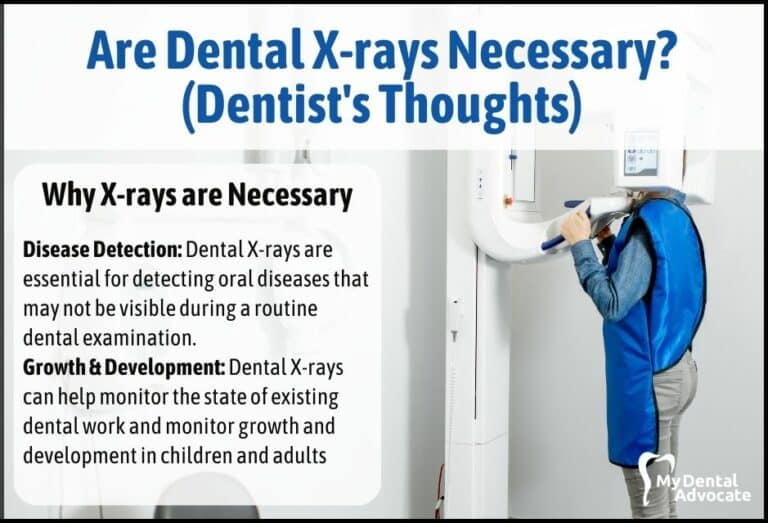
Are Dental X-rays Necessary? (Expert Advice)
Dental X-rays have been discussed in recent years, with patients and professionals alike questioning their necessity and safety. As we dive into this topic, we aim to explore the purpose, types, and potential risks associated with dental X-rays. While dental X-rays have undeniably revolutionized dental care, concerns surrounding their safety have arisen, mainly due to radiation exposure.
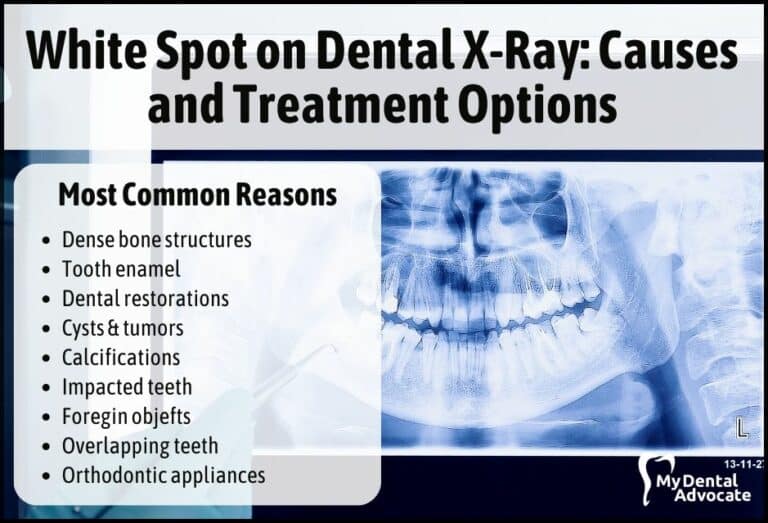
White Spot on Dental X-Ray (Best Advice)
If you’ve recently had a dental x-ray, you might have noticed a white spot on the image. While this can be concerning, it’s important to understand what these spots mean and how they can impact your oral health.

Baby Teething (Signs, Symptoms & Solutions)
Irritable babies drooling excessively and gnawing on their hands may be teething. Teething occurs when baby teeth erupt and can be uncomfortable for little ones. In addition, it can be incredibly stressful for parents and caregivers…
Gain Clarity with Our FREE Second Opinion Guide
Receive clear, expert second opinions online within 48 hours. Start today!
Product Reviews
Our 250+ dental product reviews (and counting), curated by an experienced dentist, are the most comprehensive online.
Toothbrush Genie
State-of-the-art chatbot designed to help you discover your perfect toothbrush in just a few simple steps!
Cavity Risk Assessment
Cutting-edge digital tool designed to evaluate your individual cavity risk based on your responses to a series of questions.
Gum Disease Assessment
Discover your gum disease risk with our quick and engaging 6-question assessment!
